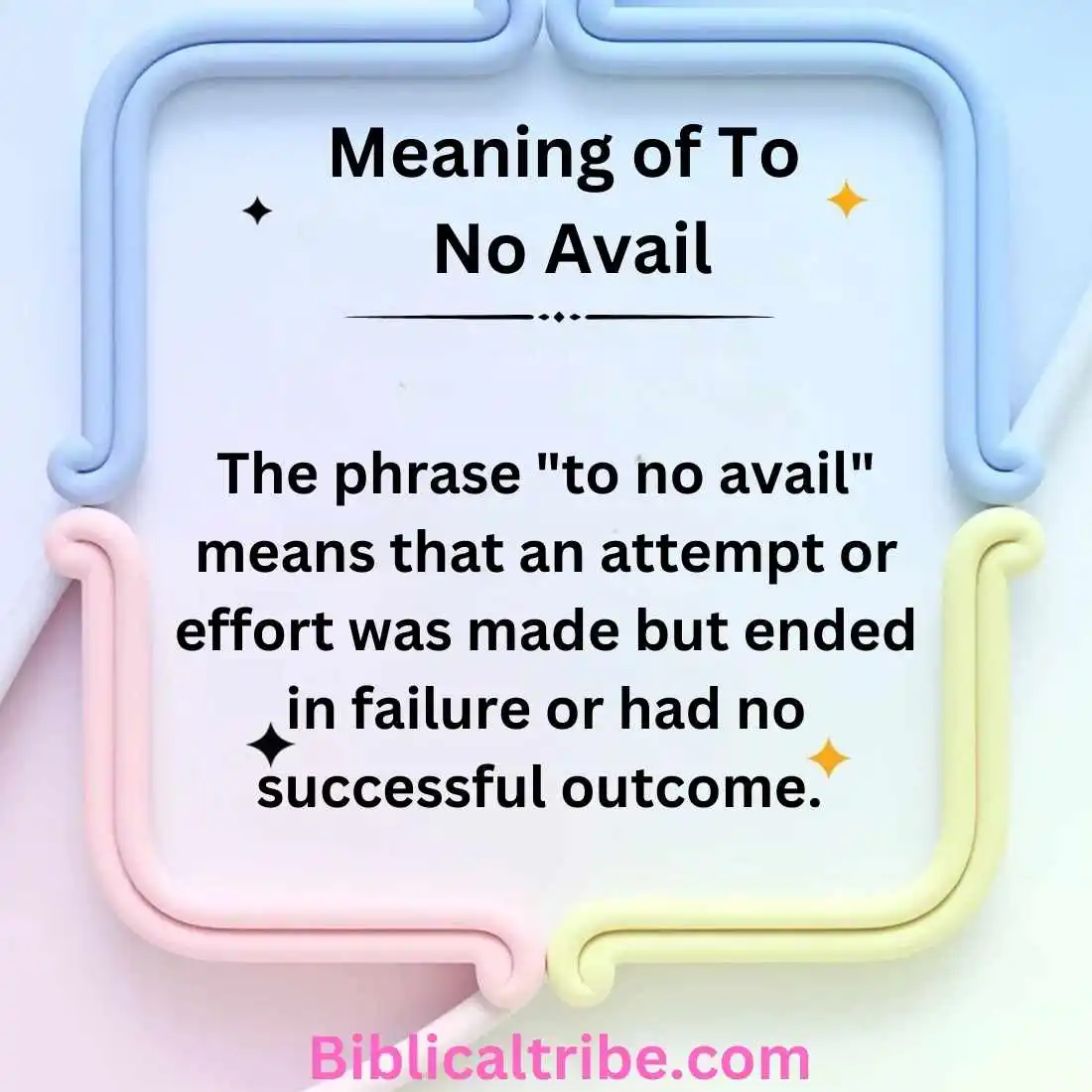Last Updated on February 3, 2025 by Ethan Richards
Have you ever come across the phrase “to no avail” and wondered what it truly means or how to use it correctly?
You’re not alone! This expression might sound familiar, but understanding its true significance can make all the difference in your communication.
Whether you’re writing an essay, giving a presentation, or having a casual conversation, mastering expressions like “to no avail” can make your language more polished and impactful.
In this article, we’ll dive into the exact meaning of this phrase, how it’s evolved, and how to incorporate it into your vocabulary in 2025.
By the end, you’ll feel confident using it in both casual and formal contexts. Let’s explore together why this phrase is not just important for your everyday speech, but also a valuable addition to your linguistic toolkit. Keep reading to learn more!
What Does “To No Avail” Mean?
The phrase “to no avail” means that an attempt or effort was made but ended in failure or had no successful outcome.
It’s often used when describing situations where someone tried hard but didn’t achieve what they set out to do. It highlights the futility or lack of success in the attempt.
Etymology of “To No Avail”
The word “avail” comes from the Old French word avaler, meaning “to be of use.” In the early 16th century, “avail” was used to describe making something helpful or useful, but when paired with “to no,” it signified that no success or benefit was achieved.
So when we say something was “to no avail,” we’re essentially saying it was an effort that was made, but it didn’t provide any results.
Common Contexts Where “To No Avail” is Used
This phrase is versatile and can be used in many different scenarios. Here are a few common situations where “to no avail” fits perfectly:
Attempts That End in Failure
When you put in a lot of work or effort but don’t get the desired result, you might say you tried to no avail. For instance, if you spent hours trying to solve a problem at work and still couldn’t find the solution, you could say:
“I’ve been working on this issue all day, but to no avail.”
Unsuccessful Efforts in Relationships
In relationships, we sometimes try to resolve conflicts or understand one another, but despite all our efforts, it might seem like we get nowhere. For example:
“I apologized multiple times, but to no avail, she’s still upset.”
Unsuccessful Attempts to Fix Something
Another scenario where “to no avail” works is when trying to fix something broken but failing. Here’s an example:
“I tried repairing the car myself, but to no avail—it’s still not starting.”
Efforts to Reach a Goal Without Success
Whether it’s a professional goal or a personal achievement, there are times when despite your best efforts, things don’t pan out. You might say:
“I worked for months on the project, but to no avail, we didn’t secure the funding.”
Examples of “To No Avail” in Sentences
Let’s dive deeper into how this phrase fits into sentences and different contexts. Here are several examples showing the phrase used in various scenarios:
- At Work:
“She tried to meet the deadline, but to no avail, the project was delayed.” - In Relationships:
“He tried explaining himself, but to no avail—she wasn’t ready to listen.” - In Personal Struggles:
“I tried dieting for weeks, but to no avail, I still couldn’t lose the weight.” - During a Conflict:
“We argued for hours about the decision, but to no avail—we couldn’t reach an agreement.”
These examples demonstrate how the phrase works in both formal and informal contexts.
Common Mistakes People Make with “To No Avail”
Even though the phrase “to no avail” is quite common, it’s easy to confuse it with other phrases that convey a similar meaning.
Let’s look at some common misuses or confusions surrounding this phrase.
Confusing “To No Avail” with “In Vain”
One common mistake is using “in vain” when “to no avail” is more appropriate.
While both mean that an effort or attempt did not succeed, “in vain” is generally used to describe actions that have moral or emotional significance, whereas “to no avail” is often more practical or goal-oriented.
For example:
- In vain: “She searched in vain for her lost necklace.”
- To no avail: “He tried fixing the sink, but to no avail—it still leaked.”
Overusing “To No Avail”
Another mistake is overusing the phrase. It’s a great expression when used in the right context, but using it too often can make your writing sound repetitive. Instead, try mixing it up with other phrases or expressions like:
- “Without success”
- “To no effect”
- “Fruitlessly”
By incorporating variety into your vocabulary, you’ll sound more natural and keep the reader engaged.
Synonyms and Alternatives for “To No Avail”
If you want to mix things up and avoid repetition, here are some great synonyms and alternatives for “to no avail” that can fit in different contexts.
| Phrase | Meaning | Example |
| In vain | With no success or result | Her efforts to study were in vain. |
| Without success | Failing to achieve the desired result | I called him multiple times without success. |
| Fruitlessly | Without producing any result | He searched fruitlessly for his missing keys. |
| To no effect | Having no noticeable outcome | I tried reasoning with him, but it was to no effect. |
Each of these phrases serves a slightly different purpose, and knowing when to use them can add nuance to your writing.
Why Understanding “To No Avail” Matters
You might be wondering: why is it important to understand a phrase like “to no avail”? Well, mastering idioms and expressions like these helps improve communication skills in both writing and speaking.
Whether you’re trying to sound more professional or simply want to express yourself more clearly, knowing the right phrases to use in the right context is a key part of effective communication.
- Clarity: Using idioms properly helps make your communication more clear and impactful.
- Fluency: Understanding these expressions makes you sound more fluent in the language.
- Confidence: When you use idioms correctly, you’ll feel more confident in both social and professional situations.
Real-Life Applications of “To No Avail”
While the phrase is commonly used in casual conversation, it also appears in historical, scientific, and cultural contexts. Understanding how this phrase fits into real-life scenarios can help reinforce its meaning.
Example 1: The Battle of Waterloo
One of the most famous historical events where efforts were to no avail was the Battle of Waterloo in 1815. Napoleon Bonaparte tried repeatedly to establish dominance in Europe, but his efforts were ultimately to no avail, resulting in his final defeat.
Example 2: Thomas Edison’s Experiments
Thomas Edison’s many failed experiments can also be described as efforts made “to no avail.” His famous quote, “I have not failed. I’ve just found 10,000 ways that won’t work,” reflects how he viewed those futile attempts. Though they didn’t result in success at the time, they were key steps towards his eventual invention of the lightbulb.
Conclusion
To sum it up, the phrase “to no avail” is a powerful expression that describes efforts or attempts that end in failure or lack of success. Whether you’re describing a failed attempt at solving a problem, resolving a conflict, or trying something that just won’t work, this phrase helps convey frustration or lack of results.
By understanding the true meaning of “to no avail” and using it correctly, you’ll enrich your communication and sound more fluent in both casual and professional conversations. Plus, knowing some useful synonyms can help you avoid repetition and improve your language skills.

Ethan Richards is an accomplished author and dream interpreter known for his insightful and thought-provoking analyses. With a keen eye for detail and a passion for biblical studies, Ethan helps readers unlock the secrets of their dreams, offering clarity and spiritual enlightenment.










